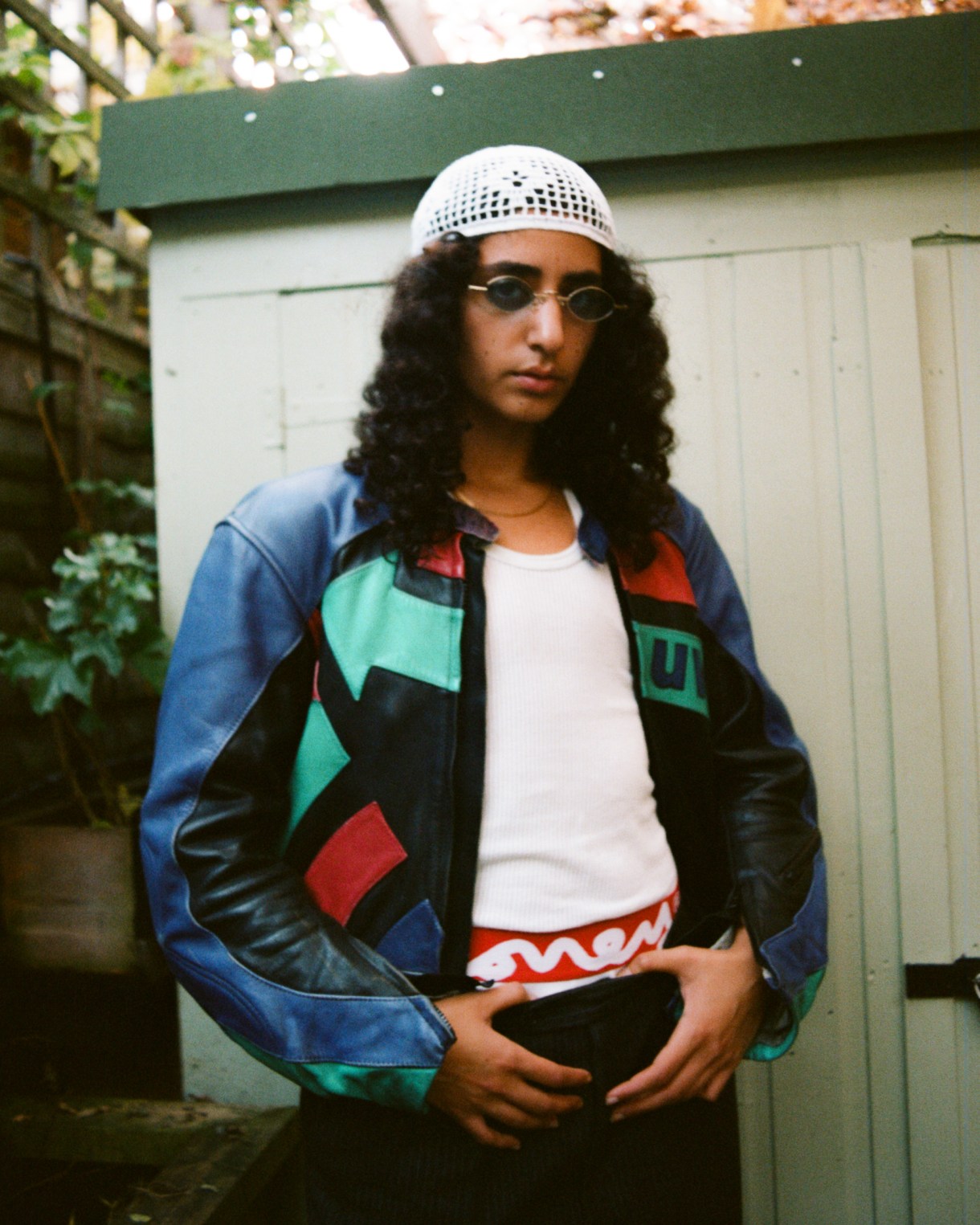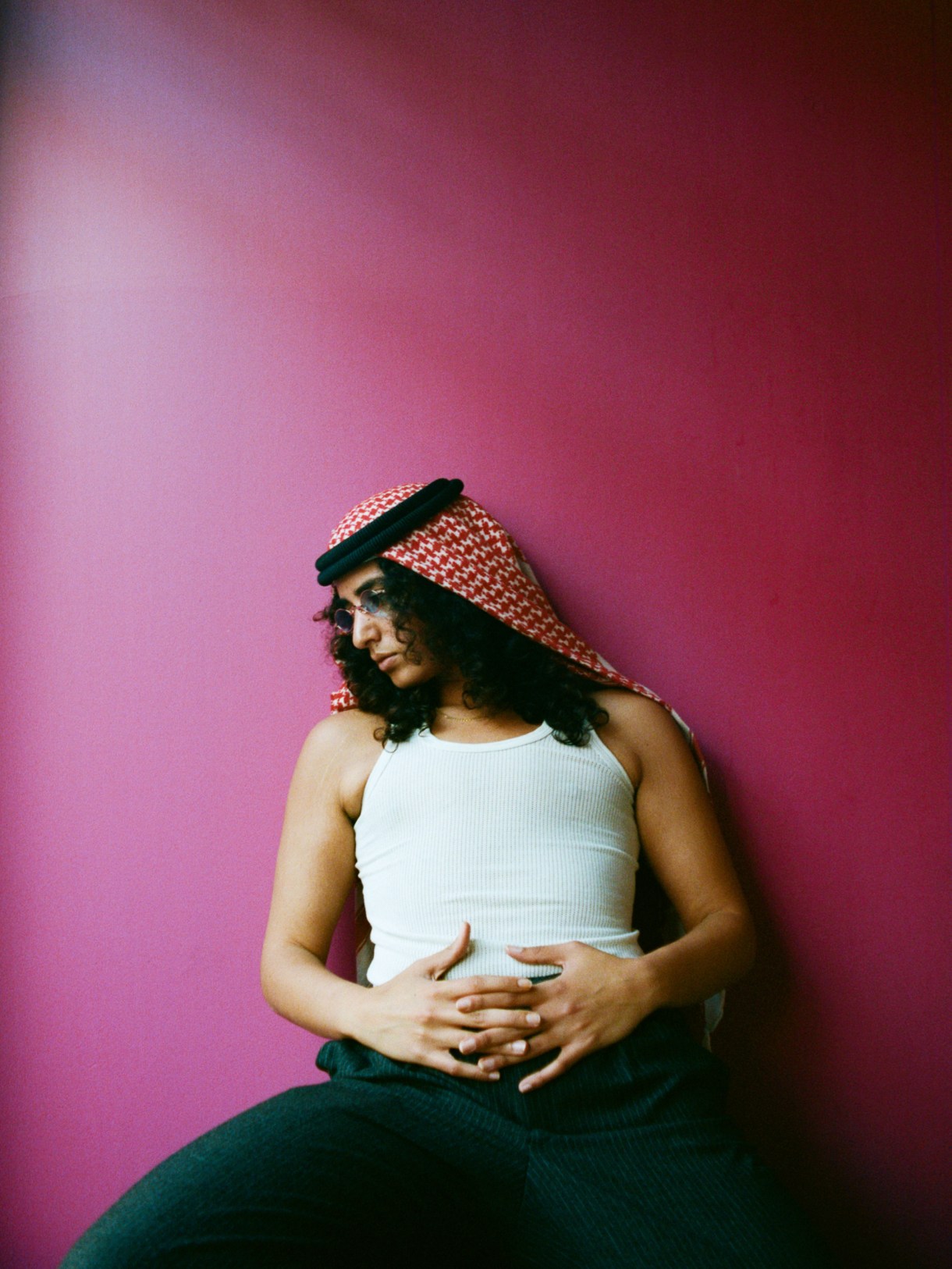
all photos by Amy Lauffer
“My name is Etaf. E, T, A, F – F, for Freddie Mercury,” Etaf (they/them) says over Zoom, cigarette in hand, appropriately sporting a Mr. Mercury-esque white tank top as they talk to me from London, “Etaf is a gender neutral name and Etaf also means deviation… these two things I identify with a lot.”
It’s an admittedly difficult task to properly encapsulate all that Etaf, who indeed deviates from any and all societal norms, embodies to folks unfamiliar. Like any renaissance individual, their talents are vast and versatile, reflecting only a fraction of the complexity of their being.
Kuwaiti-born and with cultural roots from Palestine and Lebanon, Etaf is a multi-instrumentalist, songwriter, performer, lawyer, lecturer, artist, and more (they rightfully self-described as having lived “just a thousand lives honestly…” at one point in our conversation). In 2017, Etaf moved to the UK from Kuwait in pursuit of their Masters and PHD in Law and, after receiving both, has gone into music full time.

Etaf’s upbringing in a religious home where music was considered haram (an Arabic word that in Islam means something forbidden or sinful), ensured their journey into the art was no simple feat. They first discovered they could sing at the age of 11, and would “…secretly listen to pop songs and like PussyCat Dolls and shit like that with my sister who passed away… I had a really complex relationship with it because I come from a very artistic family.” Though many of their family members could sing or play music, the taboo around the art in their home meant Etaf had to get creative with how they honed their skills.
They picked up a guitar for the first time at 15, and in only ten lessons (which they would sneak away from their house to attend), gained enough knowledge to teach themselves all the other instruments they play now. “I still call myself, when it comes to instruments, like Jack of All Trades, master of none, because I don’t have one specific instrument that I specialize with,” they say. “Although like, the Oud is my bitch for other reasons. But, I don’t excel at it in a way that other big Oud artists do… the only instrument that I couldn’t play is the violin, but I just came to terms with that.”
They didn’t get into songwriting until later, at the age of 20, when they began pouring out many of their emotions and moral beliefs into songs they have not released and may never.

“It was really tricky,” they say. “Like, I had to really navigate ways to be able to express myself musically and sing, and for a long time that wasn’t an option for me. Only when I moved to the UK and fought for my personal liberation and personal freedom that now I am able to do what I want.”
This move accelerated Etaf’s vision for their future, both as an artist and as an individual. They share how Law remains an element in their life even now, originally pursued in reclamation of their personal autonomy and freedom. Unsurprisingly and poignantly so, studying Law also reflected Etaf’s principles that “…everything since time for me was always political…,” a sentiment which comes up frequently in our time together.
Whether it be in their songwriting process, artistic visions, social media presentation, or themselves as a whole, Etaf’s commitment to the Truth — personal, metaphorical, and otherwise — always shines through. It makes sense, then, that they viewed their transition from Law into music as a natural one. In talking about their creative process, these influences and connections become clearer.
“I think it’s a negotiation between living by my values, expressing myself authentically, [and] creating my own genre, because I don’t have a specific genre that I do… if Bohemian Rhapsody was a genre, that would be my genre,” they say.

Pulling inspiration from underground artists and queer icons alike, they admit they are still experimenting with their sound and finding what feels best. Listening to what they’ve put out into the world already, Etaf’s music is an accurate reflection of who they are: nuanced, unapologetic, undefinable, ever-evolving, deviating from all that society aims to push on them.
Their most recent single “Bad Influence” features soft strings, high-pitched backing vocals, and ambient production which blends the sounds of SWANA and the West sonically and lyrically. Their signature somewhat rap, somewhat sung vocals recount, in Arabic and English, people in their life and around the world responding to Etaf’s stepping into themselves — who they’ve been told to be versus who they’ve allowed themselves to become.
Speaking on their songwriting and production process, Etaf shares that their best work often comes to them in non-musical settings. “Actually the best songs I’ve written were in the shower,” they say. Similar to their PhD process, they feel as though manufacturing time to write doesn’t work as effectively as listening to their gut.
“I feel like I’m quite an intuitive person. I know something is happening when I’m not doing it. It’s just happening in me, and then I’m just going to erupt,” they say. “Maybe it’s like being an Aquarius, something about being just spontaneous, but also like trusting my process… things just happen and erupt… I know I need to have a plan and like need to be structured, but also like…fuck structure. I’m just going to let it kind of flow.”

This eruption and flow exist not only in their music creation, but in their live performances as well. Etaf describes the stage as where they belong, feeling fueled by the energy exchange they get to have with their audience. From their first performance to a crowd of 50 people at The Water Rats in London, to now performing to crowds of multiple thousands, they say, “if there’s one place you ask me to choose to be in the rest of my life, it would be being on stage. I love it so much.”
After leaving their label after the escalation of genocide in Palestine in October 2023, Etaf stepped more into their cultural heritage in their work. “Since releasing Taboot, which was my first song written independently and with a Palestinian accent, I was like, ‘oh my God, I could do that… I’m okay to do that!’ My heritage is also Levantine, and I want to celebrate that… so it really opened a lot of doors for me in terms of my self expression.”

Formerly a hijabi, Etaf spent years moving through the complexities of removing their hijab and re-discovering what self-expression meant to them. Vulnerably recounting how it was one of the most confusing processes in their life, they were able to find ways to remain true to who they were both as a hijabi who felt uncomfortable presenting as such, and now, presenting in the way they feel reflects who they are.
Etaf’s style is effortlessly chic, blending 70s Arab Uncle realness with a modern baddie flare that would make any a queer person experience some form of gender envy. They emphasize needing to feel in their body while they perform. “Don’t tell me to wear this high heel or like wear makeup or — I want to sweat. I want to feel good. I want to sing and I want to engage with my audience,” they say. “And for me to engage with them, I want to feel comfortable.”

Constantly told otherwise, Etaf has never felt that any part of them is Awrah (an Arabic word which in Islam means parts of your body that needs to be covered for modesty’s sake). “In my song ‘Small Details,’” they explain, “I say: ‘talking to an AFAB like they’d be telling you you’re an Awrah / Bismasharaf (“in the name of honor”) / Let me give you, habibti (Arabic for “my love,” feminine), a confession / It feels so good to become a thawra,’ which means revolution… and this really was my experience.”
Continuing their evolution, Etaf shares they eventually made the decision to undergo top surgery, saying fondly, “I feel like I’m in my body for the first time ever. It’s a kind of joy that I’ve never experienced before… I’m like, I can be on stage now and like I can also show the world… I’m not apologetic about it because I feel so good. It’s worth it… whatever response I get, I don’t care. The pleasure that I get and expressing myself is great, so I really celebrate that and I feel so proud of it so, I bring it on, I bring it on for sure.”
And bring it on they do. Existing as a visible queer SWANA individual means the world constantly has something to say about, for, and to you — for better or for worse. Etaf shared a range of varied reactions to their work, and especially to their simple existence online. Whether it be projections of sexism, homophobia, and racism — or alternatively, praise for who they are and what they do — Etaf is navigating (and challenging) societal structures with every breath they take, regardless if intentional or not.

“I’m just being a normal human. Like, I’m just being myself,” they say “But, being myself is not normal because it’s not within social norms. This is pretty much it really… I don’t think I’m like a superhero. I don’t think I’m special… I just want to be myself. I’m not putting any more effort to have anyone’s attention, you know, but being myself is grabbing a lot of attention, because myself is not accepted.”
Their unabashed existence makes Etaf an inspiration to many folks of shared identities. They hear from people often who can relate. “they feel inspired, they feel empowered, they feel hope,” Etaf says. “Even when I’m not singing about politics, just me being myself, being on stage, dressing how I want to, expressing my gender in the way that feels good for me, and not wearing any masks… speaking my truth is in itself, I think, impactful and radical.”

Etaf is currently preparing to write their first EP titled She Loves to Play, which they share is “all about queerness and celebration and anger and like, fuck the system.” They are expecting to release a single called “East Side” soon, a song they wrote with their brother and his friend, which celebrates their identities as Kuwaitis living in London. In the right time, they also hope to tour and perform their EP live.
Etaf remains hyper-aware of who they are and refuses to compromise their morals during any stage of this process. To describe where they are now, they use the Arabic word Al-Hamdulillah, which means praise be to God /thank God. “literally, I feel it now,” they say. “And things have only started shifting for me when I learned and practiced gratitude and understanding my privilege and understanding my positionality in the world.”



how privileged your art when women in afghanistan are not even allowed to speak to eachother
This is a very odd comment to add to an artist profile article in my opinion. It seems strange and rude to put this on this article. Nearly all the articles on this website are about some form of art (music/tv/film etc) being created, while simultaneously political and humans rights issues are occuring throughout the world, so why point to this here. Also there are some spaces here and elsewhere online and in person to discuss rights issues, but also media coverage commonly gets at least partially compartmentalized, and that isnt the fault of any individual.